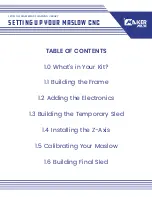
EN - T18S/R14
-25-
MAINTENANCE
Please use only Trend original spare parts and
accessories.
The power tool has been designed to operate over a
long period of time with a minimum of maintenance.
Continuous satisfactory operation depends upon proper
tool care and regular cleaning.
WARNING:
To reduce the risk of serious
personal injury, turn tool off and disconnect battery pack
before making any adjustments or removing/ installing
attachments or accessories. An accidental start-up can
cause injury.
The charger and battery pack are not serviceable.
Avoid using solvents when cleaning plastic parts. Most
plastics are susceptible to damage from various types of
commercial solvents and may be damaged by their use.
Use clean cloths to remove dirt, dust, oil, grease, etc.
WARNING:
Do not at any time let brake
fluids, gasoline, petroleum based products, penetrating
oils, etc., come in contact with plastic parts. Chemicals
can damage, weaken or destroy plastic which may result
in serious personal injury.
Electric tools used on fiberglass material, wallboard,
spackling compounds, or plaster are subject to
accelerated wear and possible premature failure because
the fiberglass chips and grindings are highly abrasive to
bearings, brushes, commutators, etc. Consequently, we
do not recommended using this tool for extended work
on these types of materials. However, if you do work with
any of these materials, it is extremely important to clean
the tool using compressed air.
Always keep your sander clean, regularly clean out the
ventilation slots.
Always keep the dust extraction holes in the vibrating
plate free of dirt or other obstructions.
Lubrication
• Your power tool requires no additional lubrication.
Cleaning
WARNING:
Blow dirt and dust out of
the main housing with dry air as often as dirt is seen
collecting in and around the air vents. Wear approved
eye protection and approved dust mask when
performing this procedure.
WARNING:
Never use solvents or other
harsh chemicals for cleaning the non-metallic parts of
the tool. These chemicals may weaken the materials
used in these parts. Use a cloth dampened only with
water and mild soap. Never let any liquid get inside the
tool; never immerse any part of the tool into a liquid.
Storage
• After use return the tool to its storage box.
ENVIRONMENTAL PROTECTION
Recycle raw materials instead of disposing as
waste.
Accessories and packaging should be sorted for
environmental-friendly recycling.
Separate collection. This product must not be disposed
of with normal household waste.
Batteries and the Environment
This unit uses Lithium Ion (Li-Ion) batteries.
When battery pack needs replacing, we
recommend the following: Discharge the energy
from the batteries by running them down
completely and then remove from the tool.
Li-Ion cells are recyclable so do not throw them away
with household waste. They may end up in an incinerator
or landfill, which must be avoided.
Instead, take the batteries to a Trend Service Agent,
your local Trend Stockist or a local recycling station. If
necessary contact your local municipality for disposal
information. The collected batteries will be disposed of
properly and/or used for recycling purposes.
Household User
Local regulations may provide for separate collection
of electrical products from the household, at municipal
waste sites or by retailer when you purchase a new
product. Please call Trend Customer Services for advice
as to how to dispose of unwanted Trend electrical
products in an environmentally safe way or visit
www.trend-uk.com
Business Users
Please call Trend Customer Services for disposal of
unwanted Trend electrical products.
GUARANTEE
The unit carries a manufacturers guarantee in
accordance with the conditions on the enclosed
guarantee card.
For the location of your nearest Trend Service Agent,
please call Trend Customer Services or see our stockist
locator at
www.trend-uk.com
Summary of Contents for T18S/R14
Page 6: ...T18S R14 6 1 2 1 2 Fig 12 Fig 13a Fig 13b Fig 14 Fig 13 Fig 13c...
Page 7: ...T18S R14 7 M6 115mm 15mm 1 2 figure 18 1 Fig 15 Fig 20 Fig 20a Fig 17 Fig 18 Fig 19 Fig 16...
Page 8: ...T18S R14 8 2 2 1 figure22 1 2 Fig 20c Fig 20b Fig 21 Fig 22 1 2 3 4...
Page 10: ...T18S R14 10 figure26b Fig 26b Fig 27...
















































